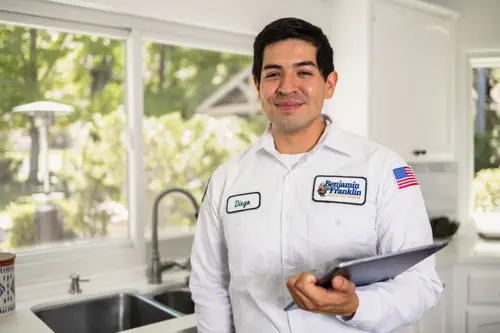 Tank-style water heaters have been standard equipment in homes and businesses for more than a century. These units operate by heating a predetermined quantity of water to a desired temperature and then storing the water until it’s needed for hygiene, dishwashing, laundry, or other uses.
Tank-style water heaters have been standard equipment in homes and businesses for more than a century. These units operate by heating a predetermined quantity of water to a desired temperature and then storing the water until it’s needed for hygiene, dishwashing, laundry, or other uses.
On the other hand, modern tankless water heaters operate on an on-demand basis. Both water heater styles have their respective advantages and drawbacks, and it’s important to understand how the various types of systems work so that you can make informed decisions when selecting a new or replacement water heater for your property.
An Explanation of Traditional Water Heater Operation
A traditional water heater is comprised of a tank that’s equipped with a gas- or electric-powered heating element that warms water as it enters the unit. The heated water remains in the tank until a hot water tap is opened or a water-using appliance is activated somewhere on the property. Although the element begins heating additional water as soon as the warmed water starts leaving the tank, it’s generally not able to keep up with demand. This means that in times of high hot water usage, the supply of heated water in the tank might run out. A significant lag time will usually result as more water is heated. Standard water heater storage tank capacities range from 40 gallons to more than 100 gallons.
How Tankless Water Heaters Work
As the name suggests, tankless water heaters don’t store heated water in a tank. Instead, these innovative units create hot water on demand. Like standard water heaters, tankless water heaters are equipped with gas or electric heating elements that warm water as it enters the system, but a tankless water heater element only operates when a hot water tap is open or an appliance is running. If the unit has been properly sized and regularly maintained, the hot water supplied by an on-demand water heater will continue as long as there’s a demand. Tankless systems take up far less floor space than traditional water heaters because they don’t employ tanks to stockpile water. This streamlined size makes them ideal for use in properties with limited square footage or unusual layouts.
Comparing and Contrasting Water Heater Styles
Tankless and tank-style water heaters are available in a range of sizes to supply sufficient water for modest family homes, large executive estates, and commercial properties alike. Tankless units generally cost more at the time of installation than traditional water heaters, but this initial expense is usually offset by lower costs of operation over their service lives thanks to reduced energy consumption. Tankless units can be counted on to function as expected for up to 20 years or even longer, while the average service lifespan of a traditional tank-style water heater is around 15 years. Tankless units usually require more frequent cleaning and more complex maintenance services, but both types of units are prone to problems caused by limescale accumulation due to hard water.
Contact Benjamin Franklin Plumbing for Water Heater Guidance
The team at Benjamin Franklin Plumbing is standing by to answer all your questions regarding traditional and tankless water heaters, so don’t hesitate to contact us for more information on all your water heater options in Niceville. Our knowledgeable team will gladly walk you through the process of deciding which water heater style is right for your property. We’re also available to handle any repair or maintenance issues that arise with your existing residential or commercial water heater.